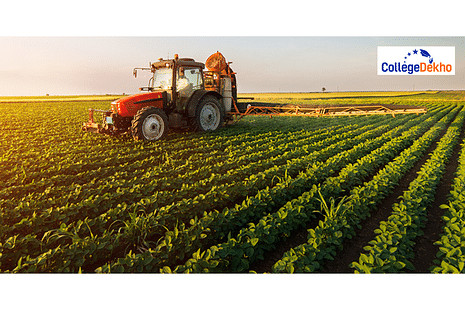Career Options after BSc Agriculture will open the multiple paths for the BSc Agriculture graduates from which candidates can choose the best one according to their interest. List of the best career options after BSc Agriculture has been provided in this article.

Career Options After BSc Agriculture: Agriculture is one of the most thriving sectors and is considered the backbone of India's rural economy. Many people are pursuing degrees in the agriculture field because it provides numerous career options and uses modern technology for efficient growth. Graduates of the BSc Agriculture programme can work in a variety of research centres, government or private institutions and agricultural firms. Modern farming and agriculture have resulted in a constant need for professionals with experience in research and development. BSc Agriculture graduates will be in high demand for a variety of roles for many years to come as more rural areas move towards urbanisation and commercial agriculture. Read on to learn more about the career options after BSc Agriculture and list of top government hiring organisations.
Candidates who wish to work in the thriving agriculture sector, earning a bachelor's degree in agriculture is an excellent way to get started. Several new job opportunities have emerged for candidates with a BSc agriculture degree.
Career Options After BSc Agriculture
A BSc in Agriculture opens up a variety of career opportunities. Following are the top career options after BSc Agriculture:
Seed Technologist: A Seed Technologist is concerned with the methods of improving the physical and genetic characteristics of seeds. Seed technology includes activities such as variety development, evolution, and release of seed varieties, as well as seed production, processing, certification, and storage.
Agricultural Officer/Extension Officer: Individuals who choose to work as agriculture officers collaborate with farmers to help them grow the best crops possible, such as corn, soybeans, cotton and wheat, based on their findings. They have extensive knowledge of chemistry, biology, geology, ecology, and genetics. One of the duties and responsibilities of an agriculture officer is to make sure that all agricultural products and activities supersede local and state laws.
Food Scientist: A food scientist applies their knowledge of life and physical sciences to develop new technologies and methods for food production, processing, and packaging. Their role includes to research, develop, and test various ingredients and foods to ensure their safety for human consumption.
Agribusiness Management: Also known as Agribusiness Management, Agricultural business management is the study of business skills and topics for people who want to start their own farms or Agribusinesses.
Farm Management: A Farm Management manages the day-to-day operations of Agricultural farms to ensure efficient production, crop management, and farm profitability. They may also be in charge of implementing agricultural best practices and managing farm resources.
Agricultural Consultants: They offer expert advice and consulting services to farmers, agribusinesses, government agencies, and non-governmental organisations (NGOs). They provide advice on crop management, soil health, pest and disease control, agricultural technology adoption, market trends, and environmentally friendly farming practices.
Plant Breeders: Plant breeders are basically genetic engineers, and their primary goal is to improve crops through various breeding techniques. The majority of breeding objectives will be similar to those of the past. They study plant characteristics and provide solutions to improve them. They also improve the performance of agricultural and horticultural crops and conduct research to develop new plant varieties.
Animal Breeders: An animal breeder specialises in selective breeding to produce offspring with desired characteristics. Breeders carefully select parent animals with specific characteristics, such as size, colour, temperament, or performance abilities, whether they work with dogs, horses, livestock, or other animals. By mating these animals, they hope to produce offspring that inherit and express the desired characteristics.
Research and Teaching: Candidates who enjoy teaching and research, consider a career in this field. Agricultural universities, colleges, and research institutions offer opportunities to become a lecturer, assistant professor, associate professor, or professor. Academic responsibilities include teaching, conducting research, publishing papers, and advising students.
Agricultural Sales Professional: An agricultural sales representative's responsibilities include prospecting for customers, educating them on machine installation, operation, and maintenance, recommending products, managing inventory, and preparing contracts and reports.
Landscape Manager: The Landscape Manager will assist with the property's restoration and maintenance, as well as other departments by leading educational opportunities, collaborating with Visitor Services, and coordinating with the Facilities and Maintenance teams.
Rural Development Officers: A Rural Development Officer works to develop rural areas and is also known as a a State Government official. He or she is primarily in charge of supervising the development plans and ensuring their implementation in the areas assigned to them.
Read Also: Top 10 Career Options after BA Course
Career Options After BSc Agriculture: Top Government Hiring Organisations
After completing a BSc Agriculture, there are numerous government job opportunities in agriculture-related departments and organisations. Following are some of the top government hiring organisations for BSc Agriculture graduates:
Union Public Service Commission (UPSC): UPSC administers exams such as the Indian Forest Service Examination and the Combined Agricultural Services Examination (CSE). UPSC-IFS is one of the major exams for prestigious job opportunities with the Indian government. Candidates can become an officer, assistant inspector, deputy forest inspector, etc. after passing these exams.
State Public Service Commissions (SPSC): State PSCs conduct examinations for state service appointments. It selects candidates for state-level agricultural departments, horticulture departments, agricultural universities, and other related services.
Agricultural Universities: Agricultural Universities in India teach, conduct research, and provide extension services in agriculture and related disciplines. They provide job opportunities to candidates in teaching, research and administrative positions.
Indian Council of Agricultural Research (ICAR): ICAR is a self-governing body under the Department of Agricultural Research and Education. They provide job opportunities in coordination, guidance, and management of agricultural research and education across the country, including horticulture, fisheries, and animal sciences.
Food Corporation of India (FCI): The Food Corporation of India (FCI) is one of the largest public-sector enterprises dealing with food grain and supply chain management. FCI conducts the FCI Exam every year to recruit eligible candidates at its various offices across the country like technical officers and technical managers.
National Bank for Agriculture and Rural Development (NABARD): NABARD is the primary regulatory body in India's rural banking system and is regarded as the country's premier development finance institution. It provides various job opportunities to candidates like A and B grade officers and development assistants with other specialised roles.
National Seeds Corporation (NSC): NSC's primary functions include seed production, proper drying and storage, and oversight of distribution and transportation processes. They provide job opportunities like management trainee, Junior Officer and many other trainee positions.
Central Warehousing Corporation (CWC): CWC has expanded from being a food grain warehousing service provider (WSP) to having a balanced revenue stream of agriculture and other notified commodities. They provide various job positions to candidates in warehousing, agricultural commodity storage and management, logistics and storage management.
National Dairy Development Board (NDDB): The NDDB's programmes and activities aim to strengthen farmer-owned institutions while also supporting national policies that promote their growth. They provide a variety of positions to agriculture graduates like deputy managers, managers and farm coordinators.
Read Also: Career Options After BBA
Agriculture is one of India's most important industries, so pursuing a bachelor's degree in the same field can provide you with a wide range of opportunities. BSc agriculture graduates can work in a variety of public and private organisations, including those involved in horticulture, dairy farming, and other agro-based industries. Candidates can also explore and pursue their chosen career path with the help of networking, practical training, and internships. Those who wish to continue their education can also pursue MSc Agriculture, an MBA in Agribusiness Management or take specialised courses to improve their knowledge and qualifications in specific areas of agriculture. Candidates who wish to work in research, should look into government jobs because they offer plenty of opportunities for learning and career advancement with a competitive pay.
Read Also: BTech (Bachelor of Technology) Career Opportunities
Hope this article was helpful. For more information and latest updates of agriculture sector stay tuned with CollegeDekho.

















Similar Articles
PhD Admission in India 2024: Dates, Eligibility, Entrance Exams, Admission Process, Top Colleges
CUET 2024 Home Science Syllabus (Released): Check Topics, Pattern, Download PDF
Important Topics for CUET Physics 2024
CUET 2024 Performing Arts Syllabus (Released): Check Topics, Pattern, Download PDF
CUET Agriculture Syllabus (Released): Check Topics, Pattern, Download PDF
CUET Passing Marks for DU 2024: Check Minimum Qualifying Marks